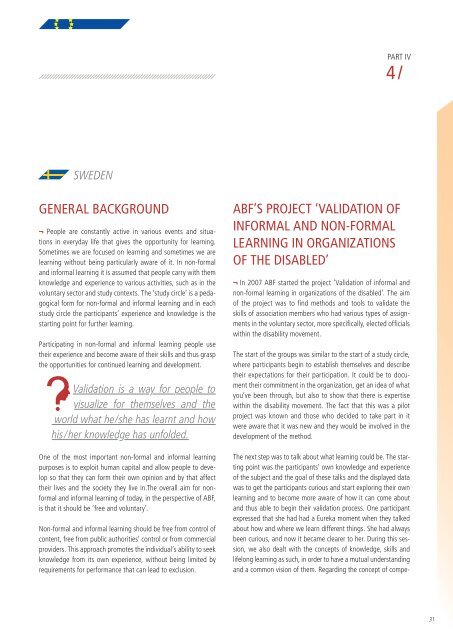RECOGNITION OF NON-FORMAL AND INFORMAL ... - Solidar
RECOGNITION OF NON-FORMAL AND INFORMAL ... - Solidar
RECOGNITION OF NON-FORMAL AND INFORMAL ... - Solidar
You also want an ePaper? Increase the reach of your titles
YUMPU automatically turns print PDFs into web optimized ePapers that Google loves.
PART IV<br />
4 /<br />
SWEDEN<br />
GENERAL BACKGROUND<br />
¬ People are constantly active in various events and situations<br />
in everyday life that gives the opportunity for learning.<br />
Sometimes we are focused on learning and sometimes we are<br />
learning without being particularly aware of it. In non-formal<br />
and informal learning it is assumed that people carry with them<br />
knowledge and experience to various activities, such as in the<br />
voluntary sector and study contexts. The ‘study circle’ is a pedagogical<br />
form for non-formal and informal learning and in each<br />
study circle the participants’ experience and knowledge is the<br />
starting point for further learning.<br />
Participating in non-formal and informal learning people use<br />
their experience and become aware of their skills and thus grasp<br />
the opportunities for continued learning and development.<br />
Validation is a way for people to<br />
visualize for themselves and the<br />
world what he / she has learnt and how<br />
his / her knowledge has unfolded.<br />
One of the most important non-formal and informal learning<br />
purposes is to exploit human capital and allow people to develop<br />
so that they can form their own opinion and by that affect<br />
their lives and the society they live in.The overall aim for nonformal<br />
and informal learning of today, in the perspective of ABF,<br />
is that it should be ‘free and voluntary’.<br />
Non-formal and informal learning should be free from control of<br />
content, free from public authorities’ control or from commercial<br />
providers. This approach promotes the individual‘s ability to seek<br />
knowledge from its own experience, without being limited by<br />
requirements for performance that can lead to exclusion.<br />
ABF’S PROJECT ‘VALIDATION <strong>OF</strong><br />
IN<strong>FORMAL</strong> <strong>AND</strong> <strong>NON</strong>-<strong>FORMAL</strong><br />
LEARNING IN ORGANIZATIONS<br />
<strong>OF</strong> THE DISABLED’<br />
¬ In 2007 ABF started the project ‘Validation of informal and<br />
non-formal learning in organizations of the disabled’. The aim<br />
of the project was to fi nd methods and tools to validate the<br />
skills of association members who had various types of assignments<br />
in the voluntary sector, more specifi cally, elected offi cials<br />
within the disability movement.<br />
The start of the groups was similar to the start of a study circle,<br />
where participants begin to establish themselves and describe<br />
their expectations for their participation. It could be to document<br />
their commitment in the organization, get an idea of what<br />
you’ve been through, but also to show that there is expertise<br />
within the disability movement. The fact that this was a pilot<br />
project was known and those who decided to take part in it<br />
were aware that it was new and they would be involved in the<br />
development of the method.<br />
The next step was to talk about what learning could be. The starting<br />
point was the participants’ own knowledge and experience<br />
of the subject and the goal of these talks and the displayed data<br />
was to get the participants curious and start exploring their own<br />
learning and to become more aware of how it can come about<br />
and thus able to begin their validation process. One participant<br />
expressed that she had had a Eureka moment when they talked<br />
about how and where we learn different things. She had always<br />
been curious, and now it became clearer to her. During this session,<br />
we also dealt with the concepts of knowledge, skills and<br />
lifelong learning as such, in order to have a mutual understanding<br />
and a common vision of them. Regarding the concept of compe-<br />
31
















